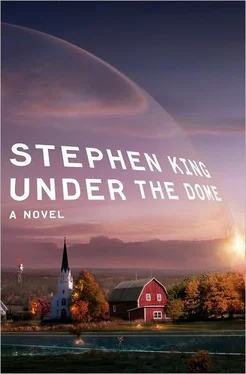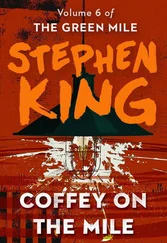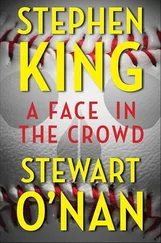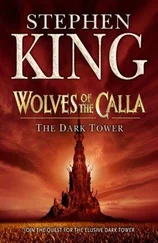“Like an ant under a magnifying glass, in other words.”
“Oh, no! No, Barbie! It was cold, not hot. I was freezing. I had goosebumps on my legs. Corrie said, ‘Let’s take her pannies, too!’ but that was a little farther than they were prepared to go. As the next best thing, maybe, Lila took my nice slacks and threw them onto the roof of the bandstand. After that, they left. Lila was the last one to go. She said, ‘If you tattle this time, I’ll get my brother’s knife and cut off your bitch nose.’ ”
“What happened?” Barbie asked. And yes, his hand was definitely resting against the side of her breast.
“What happened at first was just a scared little girl crouching there on the bandstand, wondering how she was going to get home without half the town seeing her in her silly baby underwear. I felt like the smallest, dumbest Chiclet who ever lived. I finally decided I’d wait until dark. My mother and father would be worried, they might even call the cops, but I didn’t care. I was going to wait until dark and then sneak home by the sidestreets. Hide behind trees if anyone came along.
“I must have dozed a little bit, because all at once Kayla Bevins was standing over me. She’d been right in there with the rest, slapping and pulling my hair and spitting on me. She didn’t say as much as the rest, but she was part of it. She helped hold me while Lila and Corrie pantsed me, and when they saw one of the legs of my slacks was hanging off the edge of the roof, Kayla got up on the railing and flipped it all the way up, so I wouldn’t be able to reach it.
“I begged her not to hurt me anymore. I was beyond things like pride and dignity. I begged her not to pull my underwear down. Then I begged her to help me. She just stood there and listened, like I was nothing to her. I was nothing to her. I knew that then. I guess I forgot it over the years, but I’ve sort of reconnected with that particular home truth as a result of the Dome experience.
“Finally I ran down and just lay there sniffling. She looked at me a little longer, then pulled off the sweater she was wearing. It was an old baggy brown thing that hung almost to her knees. She was a big girl and it was a big sweater. She threw it down on top of me and said, ‘Wear it home, it’ll look like a dress.’
“That was all she said. And although I went to school with her for eight more years—all the way to graduation at Mills High—we never spoke again. But sometimes in my dreams I still hear her saying that one thing: Wear it home, it’ll look like a dress. And I see her face. No hate or anger in it, but no pity, either. She didn’t do it out of pity, and she didn’t do it to shut me up. I don’t know why she did it. I don’t know why she even came back. Do you?”
“No,” he said, and kissed her mouth. It was brief, but warm and moist and quite terrific.
“Why did you do that?”
“Because you looked like you needed it, and I know I did. What happened next, Julia?”
“I put on the sweater and walked home—what else? And my parents were waiting.”
She lifted her chin pridefully.
“I never told them what happened, and they never found out. For about a week I saw the pants on my way to school, lying up there on the bandstand’s little conical roof. Every time I felt the shame and the hurt—like a knife in my heart. Then one day they were gone. That didn’t make the pain all gone, but after that it was a little better. Dull instead of sharp.
“I never told on those girls, although my father was furious and grounded me until June—I could go to school but nothing else. I was even forbidden the class trip to the Portland Museum of Art, which I’d been looking forward to all year. He told me I could go on the trip and have all my privileges restored if I named the kids who had ‘abused’ me. That was his word for it. I wouldn’t, though, and not just because dummying up is the kids’ version of the Apostles’ Creed.”
“You did it because somewhere deep inside, you thought you deserved what happened to you.”
“ Deserved is the wrong word. I thought I’d bought and paid for it, which isn’t the same thing at all. My life changed after that. I kept on getting good grades, but I stopped raising my hand so much. I never quit grade-grinding, but I stopped grade- grubbing. I could have been valedictorian in high school, but I backed off during the second semester of my senior year. Just enough to make sure Carlene Plummer would win instead of me. I didn’t want it. Not the speech, not the attention that went with the speech. I made some friends, the best ones in the smoking area behind the high school.
“The biggest change was going to school in Maine instead of at Princeton… where I was indeed accepted. My father raved and thundered about how no daughter of his was going to go to a land-grant cow college, but I stood firm.”
She smiled.
“ Pretty firm. But compromise is love’s secret ingredient, and I loved my dad plenty. I loved them both. My plan had been to go to the University of Maine at Orono, but during the summer after my senior year, I made a last-minute application to Bates—what they call a Special Circumstances application—and was accepted. My father made me pay the late fee out of my own bank account, which I was glad to do, because there was finally a modicum of peace in the family after sixteen months of border warfare between the country of Controlling Parents and the smaller but well-fortified principality of Determined Teenager. I declared a journalism major, and that finished the job of healing the breach… which had really been there ever since that day on the bandstand. My parents just never knew why. I’m not here in The Mill because of that day—my future at the Democrat was pretty much foreordained—but I am who I am in large part because of that day.”
She looked up at him again, her eyes shining with tears and defiance. “I am not an ant, however. I am not an ant.”
He kissed her again. She wrapped her arms around him tightly and gave back as good as she got. And when his hand tugged her blouse from the waistband of her slacks and then slipped up across her midriff to cup her breast, she gave him her tongue. When they broke apart, she was breathing fast.
“Want to?” he asked.
“Yes. Do you?”
He took her hand and put it on his jeans, where how much he wanted to was immediately evident.
A minute later he was poised above her, resting on his elbows. She took him in hand to guide him in. “Take it easy on me, Colonel Barbara. I’ve kind of forgotten how this thing goes.”
“It’s like riding a bicycle,” Barbie said.
Turned out he was right.
When it was over, she lay with her head on his arm, looking up at the pink stars, and asked what he was thinking about.
He sighed. “The dreams. The visions. The whatever-they-are. Do you have your cell phone?”
“Always. And it’s holding its charge nicely, although for how much longer I couldn’t say. Who are you planning to call? Cox, I suppose.”
“You suppose correctly. Do you have his number in memory?”
“Yes.”
Julia reached over for her discarded pants and pulled the phone off her belt. She called COX and handed the phone to Barbie, who started talking almost at once. Cox must have answered on the first ring.
“Hello, Colonel. It’s Barbie. I’m out. I’m going to take a chance and tell you our location. It’s Black Ridge. The old McCoy orchard. Do you have that on your… you do. Of course you do. And you have satellite images of the town, right?”
He listened, then asked Cox if the images showed a horseshoe of light encircling the ridge and ending at the TR-90 border. Cox replied in the negative, and then, judging from the way Barbie was listening, asked for details.
Читать дальше











